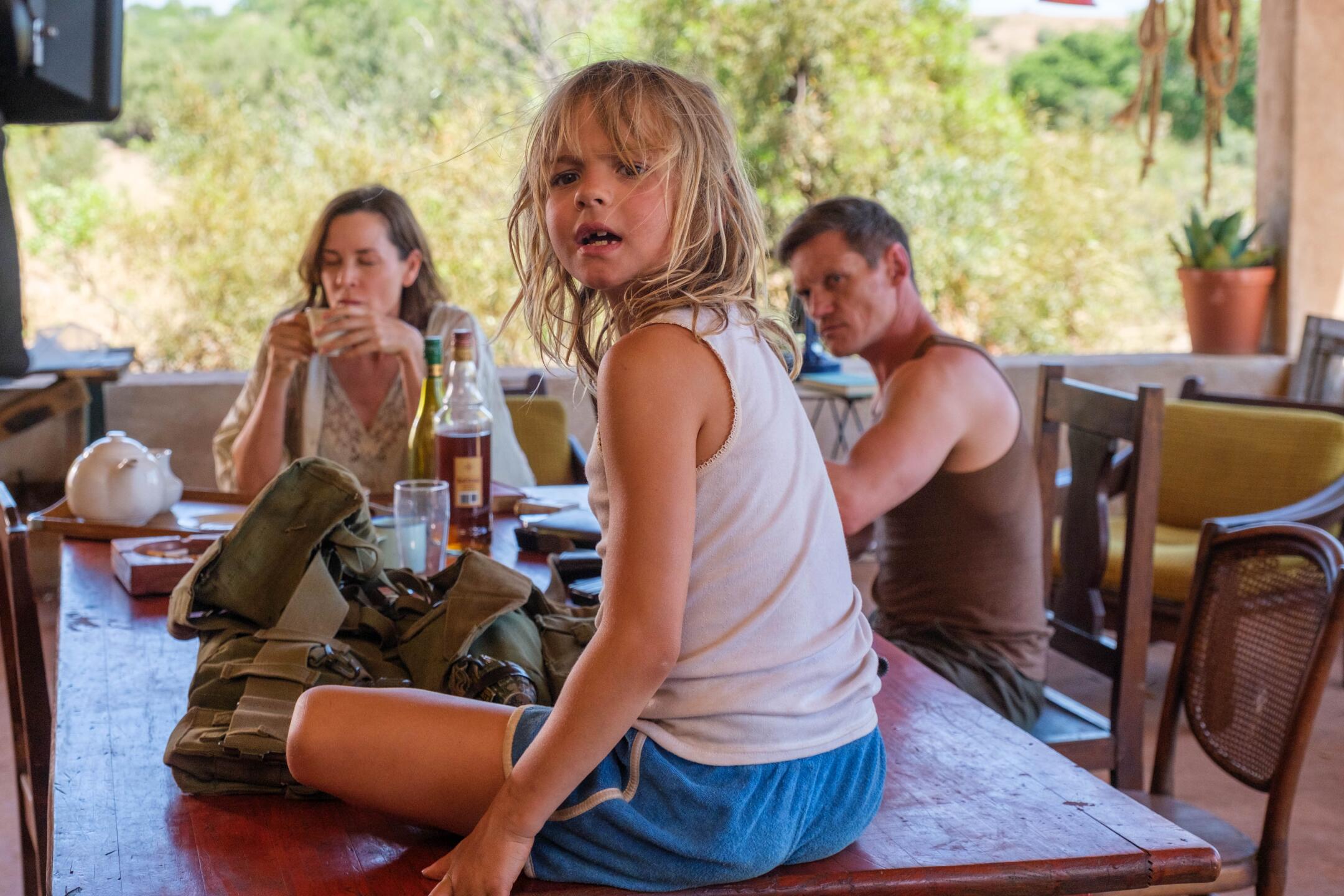
Embeth Davidtz‘s residence, located in Brentwood Park, exudes a tranquil ambiance. At 59, the renowned actor finds solace in this expansive yet warm abode, with its kitchen skylight bathing it in ample afternoon sunlight. Originally Julie Andrews’ home, this space holds a special comfort for Davidtz, a feeling she has spent much of her life searching for.
“I seldom leave,” she says, smiling. “I’m not someone who likes to run around. I like being here.”
For approximately two decades, this house has been her home – it’s where she and her spouse nurtured their children, now aged 22 and 19. In 1991, she relocated to Los Angeles, and prior to that, her life was vastly different. Lately, her mind often wanders back to those bygone days.
In the 1970s, when she was eight years old, Davidtz left America with her South African parents and moved to Pretoria amidst the country’s apartheid regime. For a long time, she had been determined to understand and confront the institutional racism she encountered during her childhood. Now, instead of focusing on acting roles as she once did in films like “Schindler’s List,” “Junebug,” and “Bridget Jones’s Diary,” Davidtz has ventured into directing with her first film, “Don’t Let’s Go to the Dogs Tonight” (opening this Friday). This powerful and sober drama is adapted from Alexandra Fuller’s 2001 memoir about life in colonial Rhodesia (now Zimbabwe), and it primarily follows Fuller’s family, but it also reflects the lessons that Davidtz continues to seek for herself.
She explains that she’s perpetually dealing with her past, stating, “It’s an ongoing reflection.” She further adds, “I believe I will continue to confront it until the day I pass away – the memories I carry with me.

1980 marks the year Rhodesia, governed by a white minority, transformed into Zimbabwe, a sovereign nation. In this context, the movie “Don’t Let’s Go to the Dogs Tonight” portrays Davidtz as Nicola, an angry, alcoholic policewoman whose lifestyle disintegrates with the unfolding Zimbabwean War, which disrupts the racial hierarchy. However, the narrative isn’t through Nicola’s eyes but rather from Bobo’s, her 8-year-old daughter (depicted captivatingly by newcomer Lexi Venter). The movie mirrors Fuller’s perspective at the time, as seen through Bobo’s voice-over narration. As we watch the film, we encounter a chilling normalization of colonialism, where our protagonist, an apparently innocent child, rides her bike with a rifle on her back and echoes the racist views of white landowners in her environment.
In a different light, Davidtz found that Zimbabwe and South Africa aren’t exactly the same, yet reading Fuller’s raw autobiography brought to light some striking similarities in the issue of racial inequality between the two nations.
“She cuts you off at the knees,” says Davidtz. “You recognize it, then you feel shame.”
Davidtz was born in Indiana, later resided in New Jersey, but when she was eight, her family relocated to Pretoria. Over the span of 17 years, South Africa significantly influenced her life. Despite having no prior experience with screenwriting for “Don’t Let’s Go to the Dogs Tonight,” she had been developing a narrative about her upbringing. However, upon reading Fuller’s memoir, Davidtz admitted, “I recall thinking, ‘That book is the ultimate on this topic. I’ll never be able to write a book like that.’
She admits that her childhood wasn’t joyful, rather it was filled with sadness and hardship. Yet, she did cherish Africa. However, it wasn’t a fairy-tale upbringing.
Bobo’s prejudiced opinions, which include the belief that Black people don’t have surnames and are covert terrorists, were not a part of Davidtz’s upbringing. As she explains, “My family didn’t behave or speak in that manner, but by being there, you were still immersed within the system.
Similar to Bobo’s family, Davidtz lived without many indulgences, but compared to the assistance they had around them, it seemed more luxurious. In her words, “If you had domestic help at home, you were part of the system.” Her parents, she explains, weren’t actively participating in civil rights marches. Instead, they found themselves in a neutral zone.
Davidtz acknowledges that she, too, may harbor some racist attitudes, as seen in her interaction with her family’s housekeeper, Sarah (Zikhona Bali). This relationship stirred up emotional wounds for her. “I have uncomfortable memories,” she confesses. “I remember playing with children [of color] and being bossy and just behaving poorly.
The emotional bond she feels towards “Don’t Let’s Go to the Dogs Tonight” runs quite deep. Unlike Fuller, whose mother was a heavy drinker, it was her father in Davidtz’s family who struggled with alcoholism. She perceives his addiction as a result of an idealism that met with harsh reality.
She stated, “He was a physical chemist, essentially a scientist,” and his selfless intention was clear: “I’ll use all I’ve learned to benefit South Africa.” This altruistic mindset led to his struggles, as the strict South African government closely monitored his activities, likely suspecting him due to his American background. He felt restricted, leading to his alcoholism. However, today he is in a better state: “He’s on medication now; he’s more composed,” she shared, “and he no longer drinks.

Davidtz struggles to trace back the source of her love for acting, stating that none of her family members share it. She suspects that a young girl of 7 years old watching ‘Sonny & Cher’ show in New Jersey, found Cher’s glamorous appearance captivating and inspiring. However, their life took an unexpected turn as they moved to a dusty farmhouse with her father unwell and no television.
In her thoughts, Davidtz managed to leave behind the city of Pretoria, immersing herself in the movies, such as “Doctor Zhivago,” a 1965 historical romance by David Lean. As she looks back, she says, “The grandeur, the narrative, the epic quality left me utterly amazed.” Perhaps it was her longing to step away from the grime and misery, and strive for something more elevated instead.
In “Don’t Let’s Go to the Dogs Tonight,” there’s no unnecessary violence associated with racial themes, unlike many films. Instead, it portrays a system of class hierarchy controlled by white characters who push for specific candidates in the upcoming election to preserve their dominance. However, when Robert Mugabe takes power, this old order crumbles, resulting in a disturbing moment where Nicola uses a whip to keep Black Africans off her farm, asserting ownership over what she perceives as her territory.
In Davidtz’s thoughts, there was some doubt about a white woman narrating a tale from Zimbabwe. Despite this, she thoroughly researched the region. However, due to Zimbabwe’s ongoing political instability, they ended up shooting in South Africa instead. During their discussions with cinematographer Willie Nel, they talked about how the film should visually represent the story.
Davidtz recalls, “I wanted the light filtering through her eyes, just as it was then. I desired a close-up of the grime on her fingernails. This is how Peter Weir and Terrence Malick achieve extreme closeness, capturing skies and nature.” And she ensured to focus her critical tale of adolescence centered around white characters, criticizing them – even young Bobo.
As a movie critic, I find myself compelled to express a perspective that may challenge some conventional wisdom. In this particular film, I believe it would be misguided for a Black filmmaker to capture the unique experiences of a white child character. Instead, I firmly believe that a white filmmaker is best equipped to portray this narrative accurately.
In this production, there are instances where director [Bobo] may not fully grasp the intentions or actions of the Black characters. This was not a mere oversight, but rather a deliberate approach intended to tackle the complexities of cross-cultural interactions with care. I must clarify that my intention is not to evoke sympathy for the white child character in any way. Instead, I aim to highlight the nuances and subtleties of the story that [Bobo] has skillfully woven into this film.
Davidtz stated that she felt it was essential for Nicola to appear extremely unpleasant and hateful, a fervent bigot, in order to accurately depict the situation at hand. “It was necessary for her character to be malevolent,” he explained, “because that’s how people actually behaved.
In a previous role, she portrayed a character with an unsympathetic and alluring edge as the villain. However, for Nicola’s part, she aimed to avoid any hint of sympathy or charm that might make her appealing. Reflecting on her performance as Mary Crawford in the 1999 version of “Mansfield Park,” Davidtz noted, “She was simply living life – being wicked, but with a smile. She was charming. That was more tolerable, easier to swallow.” Here, she refused to show any of that charisma, instead delving into the despair of a woman whose identity is tied to controlling those around her.
The seasoned actress has frequently delivered outstanding performances by taking on smaller roles, with her career-defining moment occurring as a cherished Jewish maid in the 1993 film “Schindler’s List,” portrayed by Ralph Fiennes’ character, a ruthless Nazi. Lately, Davidtz has garnered critical acclaim for series like “Ray Donovan” and “The Morning Show.” She avoids flashy performances and remains humble in real life, maintaining an endearing modesty and soft-spoken demeanor. However, in “Don’t Let’s Go to the Dogs Tonight,” Davidtz delivers a daringly brash performance as Nicola, embodying the repugnant face of arrogant entitlement. Despite feeling apprehensive about portraying such an overtly racist character, especially amidst her Black co-stars, she also found it invigorating to approach a role in this unexpected manner.
She expresses that the performance was tough and intimidating, yet essential. For her role in “Don’t Let’s Go to the Dogs Tonight,” she found it straightforward because there was no time for anything else. Her entire focus was on the three hours she spent with the child each day. It was a rush to get everything done swiftly, and by the time they filmed much of her scenes, she was at the end of her tether – which perfectly suited her character as she was quite drained by then.

Just as “The Zone of Interest” captivates me with its raw portrayal (“I’m utterly captivated by this film,” I exclaim), “Don’t Let’s Go to the Dogs Tonight” offers a chilling depiction of ingrained prejudice, peeling away layers of simplistic judgments. The characters like Bobo, her parents, and other white settlers thrive within an unjust system, their comfort and contentment casually depicted, while the local indentured people suffer the consequences. I find myself questioning if Davidtz is revealing to us the everyday face of evil.
She responds with a milder term, “That’s quite severe,” she says. “I’d prefer ‘unaware’, ‘ignorant’, or ‘accountable’. It encompasses all three. The novel ‘The Zone of Interest’ reminded me of something similar. It’s the casual prejudice that’s striking. A viewer watching [the film] might think, ‘Wow, that was ordinary for them.’ Then the full picture emerges. Only then does the true nature of it become apparent.
In her autobiography, Fuller narrates her late-life political realization, an experience that Davidtz also went through. She recounts instances such as police brutally apprehending men on the streets, shoving them into police vans. “I felt a sense of terror,” she explains. “It was clear to me, ‘If you’re white, you’re secure. If you’re Black, you’re not.’ As I grew older, I began to grapple with the discrepancy between what I saw happening and what I believed was just.
Davidtz experienced a significant transformation when she enrolled at South Africa’s liberal Rhodes University in the early 1980s and participated in protest marches. She described this period as her “great awakening,” adding that this realization was not a one-time event, but an ongoing process.
In the tranquil haven of Davidtz’s residence, a recurring sound is prevalent: the lively banter of news reports. As she expresses, this sound is usually playing softly in the background, but she acknowledges that it might be a habit gradually eating away at her inner calm. Like many residents of Los Angeles, she yearns to remain updated on global events such as the ongoing conflict in Gaza, developments in Ukraine, and the disturbing ICE raids in Southern California. Yet, she strives to avoid sinking into despair and anger. Despite her attempts at quietness, she doesn’t wish to detach from the world entirely.
She notes that if you’ve experienced a situation where things were badly wrong, you tend to notice injustices more readily, whether they occur locally or globally. Her suggestion is simply that “we should speak up about our thoughts and beliefs.” Reflecting on her past, she proposes that her motivation for creating this film likely stems from the observation of something unjust for a prolonged period. She believes that part of her will always feel compelled to express, “I find this situation not acceptable.
In “Don’t Let’s Go to the Dogs Tonight,” Davidtz is voicing her concerns, yet she acknowledges that the dark past continues to loom large. If anything, it feels more prevalent than ever. As the movie concludes, Bobo casts one final gaze at the town and its inhabitants who have molded her. There’s a sliver of optimism that this young girl may someday rise above the racial prejudice she has been exposed to. However, the land – and the suffering it carries – persists. Davidtz refuses to turn a blind eye to these realities.
Read More
- Clash Royale Best Boss Bandit Champion decks
- Vampire’s Fall 2 redeem codes and how to use them (June 2025)
- Mobile Legends January 2026 Leaks: Upcoming new skins, heroes, events and more
- World Eternal Online promo codes and how to use them (September 2025)
- Clash Royale Season 79 “Fire and Ice” January 2026 Update and Balance Changes
- Best Arena 9 Decks in Clast Royale
- Best Hero Card Decks in Clash Royale
- Clash Royale Furnace Evolution best decks guide
- FC Mobile 26: EA opens voting for its official Team of the Year (TOTY)
- Clash Royale Witch Evolution best decks guide
2025-07-09 23:31